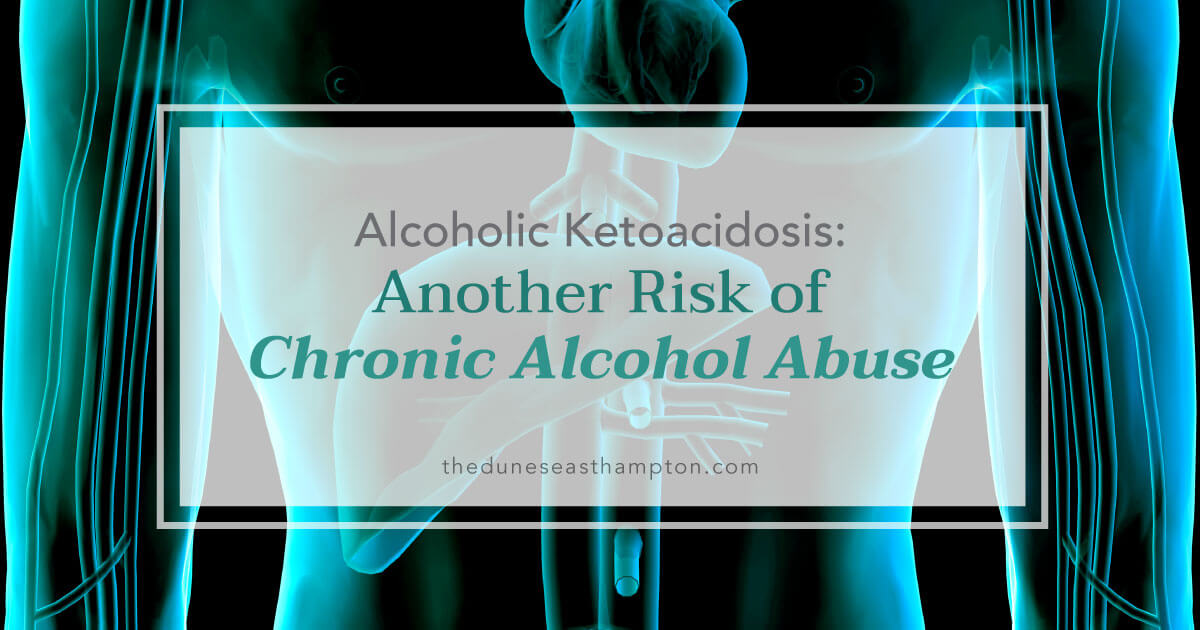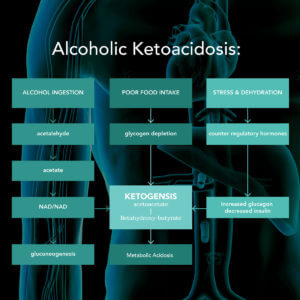 Alcohol acts like poison within the human body. It enters the bloodstream and affects every part of the body, making the drinker vulnerable to serious health consequences. Chronic alcohol abuse exposes the central nervous, digestive, circulatory, immune, skeletal, and muscle systems to severe and long-lasting damage. Alcoholic ketoacidosis (AKA) is a disease that develops from drinking too much alcohol. Learn about this harmful condition and what you can do to prevent it.
Alcohol acts like poison within the human body. It enters the bloodstream and affects every part of the body, making the drinker vulnerable to serious health consequences. Chronic alcohol abuse exposes the central nervous, digestive, circulatory, immune, skeletal, and muscle systems to severe and long-lasting damage. Alcoholic ketoacidosis (AKA) is a disease that develops from drinking too much alcohol. Learn about this harmful condition and what you can do to prevent it.
What Is Alcoholic Ketoacidosis?
 Alcoholic ketoacidosis occurs when there is an unhealthy buildup of ketones in the body. Ketones are a byproduct of the body burning fat instead of glucose for energy. Cells need glucose and insulin to function properly. The pancreas produces insulin, and glucose comes from the foods you eat. Consuming too much alcohol regularly, combined with a poor diet, can lead to the pancreas failing to produce insulin for a short time. This leads to your body burning fat for energy instead of using the glucose you consume. Without the production of insulin, ketones build up in the bloodstream, causing the life-threatening condition of AKA.
Alcoholic ketoacidosis occurs when there is an unhealthy buildup of ketones in the body. Ketones are a byproduct of the body burning fat instead of glucose for energy. Cells need glucose and insulin to function properly. The pancreas produces insulin, and glucose comes from the foods you eat. Consuming too much alcohol regularly, combined with a poor diet, can lead to the pancreas failing to produce insulin for a short time. This leads to your body burning fat for energy instead of using the glucose you consume. Without the production of insulin, ketones build up in the bloodstream, causing the life-threatening condition of AKA.
Ketoacidosis occurs when the body digests something that gets turned into acid. Alcoholic ketoacidosis happens when excessive amounts of alcohol cause digestive problems. Failure to follow a holistic approach, such as eating a balanced diet, combined with excessive drinking and/or vomiting, leads to blood that is too acidic. Alcoholic ketoacidosis can be fatal, and requires treatment right away.
Symptoms of Alcoholic Ketoacidosis
Knowing how to identify AKA will help you recognize this condition in yourself or loved ones early on, giving you the best chance of recovery. This condition is treatable, but only with swift action to stop excessive alcohol consumption, improve nutrition, and make better lifestyle choices. Alcoholic ketoacidosis symptoms include:
- Abdominal Pain
- Loss of Appetite
- Nausea and Vomiting
- Fatigue
- Decreased Alertness
- Sluggish Movement
- Irregular Breathing
- Symptoms of Dehydration
- Mental Confusion
- Unexplained Weight Loss
If you or a loved one experiences any of these symptoms, especially after binge drinking, seek professional help immediately. Visit a hospital for emergency medical care and consider a treatment facility to treat alcoholism. If you need help talking to a loved one, look into family resources for alcohol addiction treatment.
How to Treat Alcoholic Ketoacidosis
Alcoholic ketoacidosis can put a person in a lot of pain and ultimately lead to death. It can cause pancreatitis, coma, psychosis, or encephalopathy, a brain disease. Fortunately, AKA is treatable and avoidable. One can prevent AKA from ever occurring by avoiding binge drinking and addressing alcohol abuse early on. Alcoholic ketoacidosis treatment, tackling alcohol issues right away is the best way to avoid AKA, as it prevents malnourishment due to excessive drinking. Good nutrition is also important, as it keeps the pancreas functioning normally.
Once a person has AKA, it is critical to seek emergency treatment for symptoms right away. Doctors can administer sugars and salts intravenously to counteract the effects of AKA, and monitor the blood composition and ketone levels of the patient. Doctors may treat malnutrition with vitamins and nutrients. Recovering from AKA depends on the patient’s decision to seek treatment for alcoholism and avoid a relapse. If you’ve suffered symptoms of AKA, seek help from a professional treatment center.







